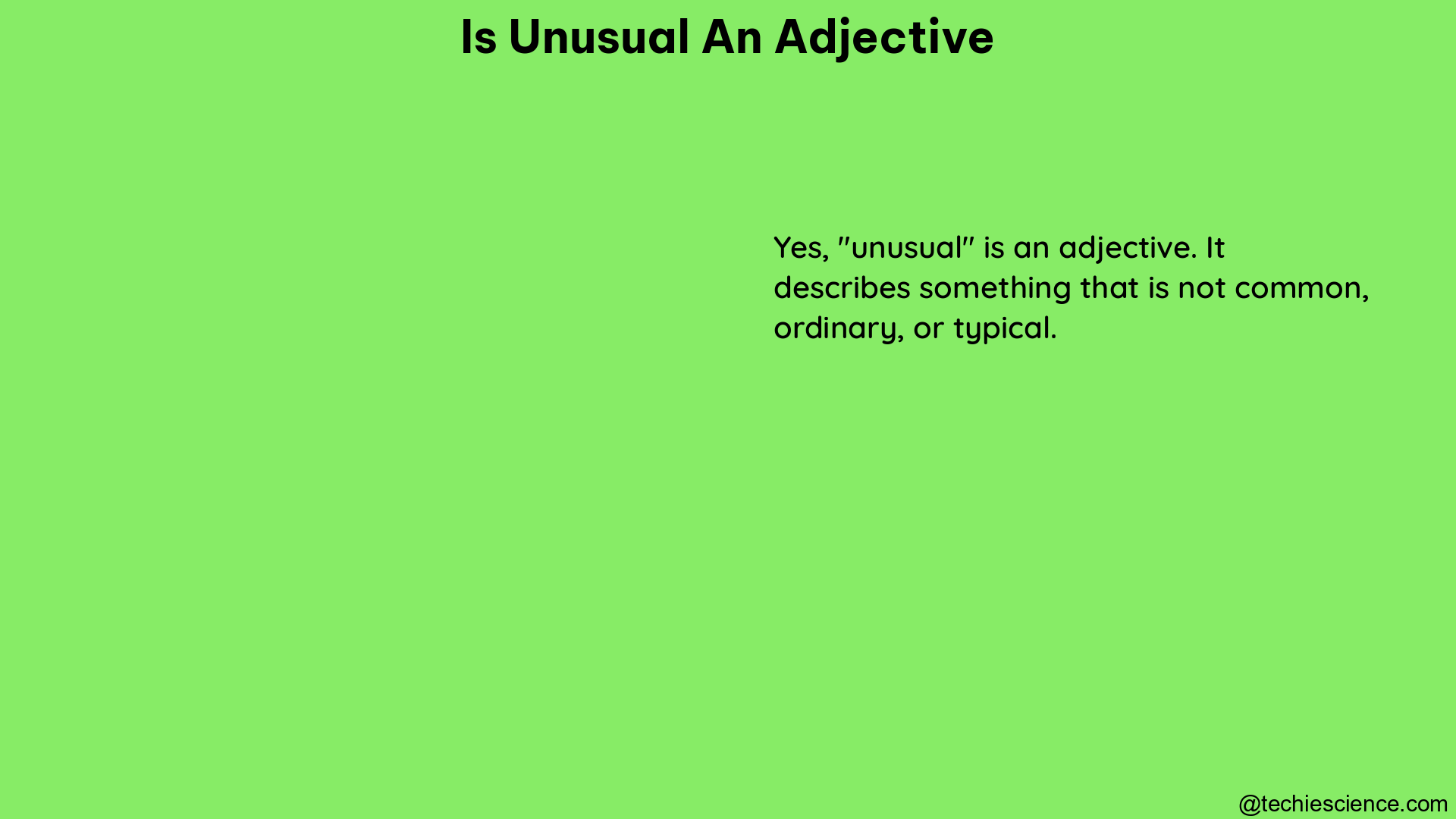“Unusual” is an adjective that describes something that is not common or typical, often in an interesting or remarkable way. This comprehensive guide will delve into the grammatical specifications, theoretical explanations, examples, synonyms, antonyms, and advanced details surrounding the use of “unusual” as an adjective.
Grammatical Specification and Theoretical Explanation
Definition
The adjective “unusual” means not usual or common, often implying something that is uncommon, rare, or out of the ordinary. It is used to describe a person, thing, or situation that deviates from the norm or standard.
Pronunciation
The pronunciation of “unusual” is /ʌnˈyuʒuəl/ or /ʌnˈyuʒəl/.
Etymology
The earliest known use of the adjective “unusual” dates back to the late 1500s, with the first recorded evidence found in a 1582 translation by Richard Stanyhurst. The word is derived from the prefix “un-” (meaning “not”) and the adjective “usual,” which has its roots in the Latin word “usus,” meaning “use” or “custom.”
Parts of Speech
As an adjective, “unusual” can be used to modify nouns, pronouns, or other parts of speech to describe their uncommon or extraordinary nature. For example:
- “She has an unusual talent for painting.”
- “The unusual weather patterns have caused disruptions in the region.”
- “It’s unusual for him to be late for work.”
In addition, “unusual” can also be used as an adverb, in the form of “unusually,” to describe an action or state that is not typical or common. For example:
- “The flowers bloomed unusually early this year.”
- “She performed unusually well on the exam.”
The noun form of “unusual” is “unusualness,” which refers to the quality or state of being unusual or uncommon.
Grammatical Functions
As an adjective, “unusual” can serve various grammatical functions within a sentence, including:
- Attributive Adjective: “The unusual design of the building caught everyone’s attention.”
- Predicative Adjective: “The weather today is quite unusual for this time of year.”
- Postpositive Adjective: “The scenery, unusual for this region, was breathtaking.”
Examples of “Unusual” as an Adjective

Here are some examples of how “unusual” can be used as an adjective in various contexts:
- “It’s unusual for the trees to flower so early in the spring.”
- “She has a very unusual name that is difficult to pronounce.”
- “The artist’s unusual choice of colors in the painting created a striking visual effect.”
- “The company’s unusual business model has allowed it to thrive in a competitive market.”
- “The unusual behavior of the animal caught the attention of the researchers.”
- “The unusual combination of flavors in the dish made it a unique culinary experience.”
- “The unusual weather patterns have caused disruptions in the region’s agricultural production.”
- “The unusual architecture of the building has made it a popular tourist attraction.”
- “The unusual circumstances surrounding the event have led to a lot of speculation and debate.”
- “The unusual appearance of the new product has generated a lot of interest among consumers.”
Synonyms and Antonyms of “Unusual”
Synonyms
Some synonyms of the adjective “unusual” include:
- Extraordinary
- Unique
- Exceptional
- Rare
- Uncommon
- Abnormal
- Odd
- Remarkable
- Peculiar
- Atypical
- Irregular
- Unconventional
- Unorthodox
- Anomalous
Antonyms
Antonyms, or words with the opposite meaning, of the adjective “unusual” include:
- Usual
- Common
- Ordinary
- Normal
- Typical
- Conventional
- Regular
- Standard
- Customary
- Routine
- Familiar
- Everyday
- Mundane
Advanced Details
Adverb Form: “Unusually”
The adverb form of “unusual” is “unusually,” which is used to describe an action or state that is not typical or common. For example:
- “The flowers bloomed unusually early this year.”
- “She performed unusually well on the exam.”
- “The weather was unusually warm for this time of year.”
Noun Form: “Unusualness”
The noun form of “unusual” is “unusualness,” which refers to the quality or state of being unusual or uncommon. For example:
- “The unusualness of the situation caught everyone by surprise.”
- “The unusualness of the artist’s style is what makes their work so captivating.”
- “The unusualness of the event has generated a lot of media attention.”
Conclusion
In summary, “unusual” is a versatile adjective that is used to describe something that is not common or typical, often in an interesting or remarkable way. It has a rich history, with its earliest known use dating back to the late 1500s, and it can serve various grammatical functions within a sentence. Understanding the nuances of “unusual” as an adjective, including its pronunciation, etymology, synonyms, and advanced forms, can help writers and speakers use it effectively in their communication.
References
- Oxford Learners Dictionaries. (n.d.). Unusual. Retrieved from https://www.oxfordlearnersdictionaries.com/us/definition/american_english/unusual
- Oxford English Dictionary. (n.d.). Unusual, adj. Retrieved from https://www.oed.com/dictionary/unusual_adj
- Merriam-Webster. (n.d.). Unusual. Retrieved from https://www.merriam-webster.com/thesaurus/unusual
- Merriam-Webster. (n.d.). Unusual. Retrieved from https://www.merriam-webster.com/dictionary/unusual
- Vocabulary.com. (n.d.). Unusual. Retrieved from https://www.vocabulary.com/dictionary/unusual

Hi…..I’m a graduate with a Bachelor’s degree in English Literature. I wish to do a Masters in the same field someday and continue my career in Academia.
Let’s connect through LinkedIn: